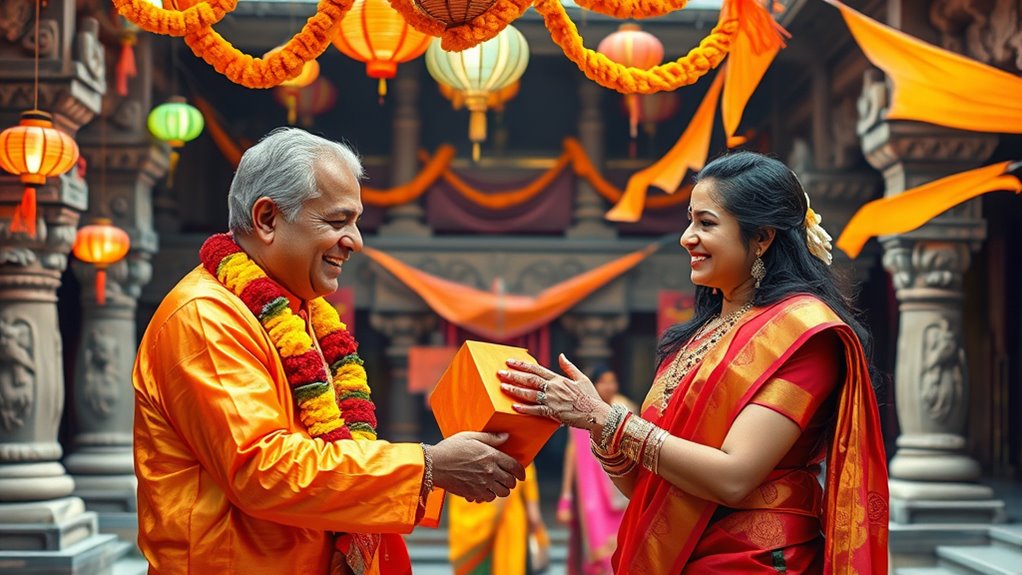When giving gifts in India, choose symbols like flowers, sweets, or water motifs that show thoughtfulness and respect. Wrap presents brightly and neatly, using colors like red or yellow, and add ribbons for a special touch. Time your gifts for festivals or celebrations, avoiding serious situations. Be mindful of regional customs, and present modestly, especially in business, with both hands. Continue exploring to uncover deeper insights into Indian gift-giving traditions.
Key Takeaways
- Choose culturally appropriate gifts like flowers, sweets, or symbolic items, avoiding sharp objects or clocks.
- Present gifts with both hands and wrap them neatly in bright, vibrant colors like red or yellow.
- Give gifts during festivals or special occasions, avoiding serious or inappropriate moments.
- Respect regional customs by considering local traditions, such as avoiding leather items or clocks in certain areas.
- Follow business etiquette by adhering to company policies, maintaining modesty, and accepting gifts graciously.
The Significance of Gift Types and Selection

Choosing the right type of gift is essential in India, as it reflects respect and thoughtfulness. In Indian culture, gift symbolism plays a significant role, with certain items carrying specific meanings. For example, flowers, especially marigolds, symbolize auspiciousness and positivity, while sweets represent good wishes and prosperity. When selecting gifts, focus on symbolic gestures that convey your good intentions and understanding of cultural nuances. Avoid items that have negative associations or are considered inauspicious, such as sharp objects or clocks. The significance of gift types extends beyond their physical form; it’s about the message they send. Thoughtful choices demonstrate your appreciation and respect for Indian traditions, ensuring your gesture is both meaningful and culturally appropriate. Additionally, understanding cultural symbolism can help you select gifts that resonate more deeply and foster positive relationships. Being aware of water-related symbols, such as flowing water or aquatic motifs, can also be meaningful, as water often signifies purity and life in Indian culture.
Proper Presentation and Wrapping Techniques
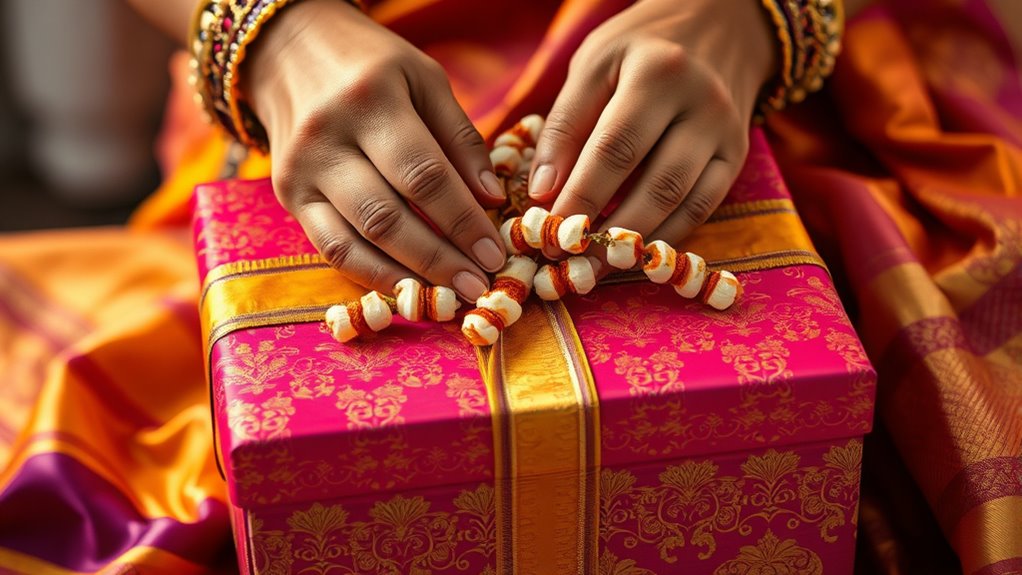
Presenting your gift beautifully is as important as selecting the right one, as it reflects your respect and thoughtfulness. Use appropriate wrapping styles that align with Indian customs, such as vibrant colors or simple, elegant paper. Follow these key presentation etiquette tips:
Present your gift with vibrant wrapping and elegant touches to show respect and thoughtfulness.
- Choose wrapping paper that is neat and free of wrinkles.
- Use bright colors like red, yellow, or orange, which symbolize happiness.
- Make certain the gift is securely wrapped, with tape hidden for a clean look.
- Add a tasteful ribbon or bow to enhance the presentation.
- Practicing stillness while wrapping can help improve your focus and ensure a neat finish. Incorporating cultural significance into your wrapping choices can also demonstrate your understanding and respect for Indian traditions.
Timing and Situational Appropriateness
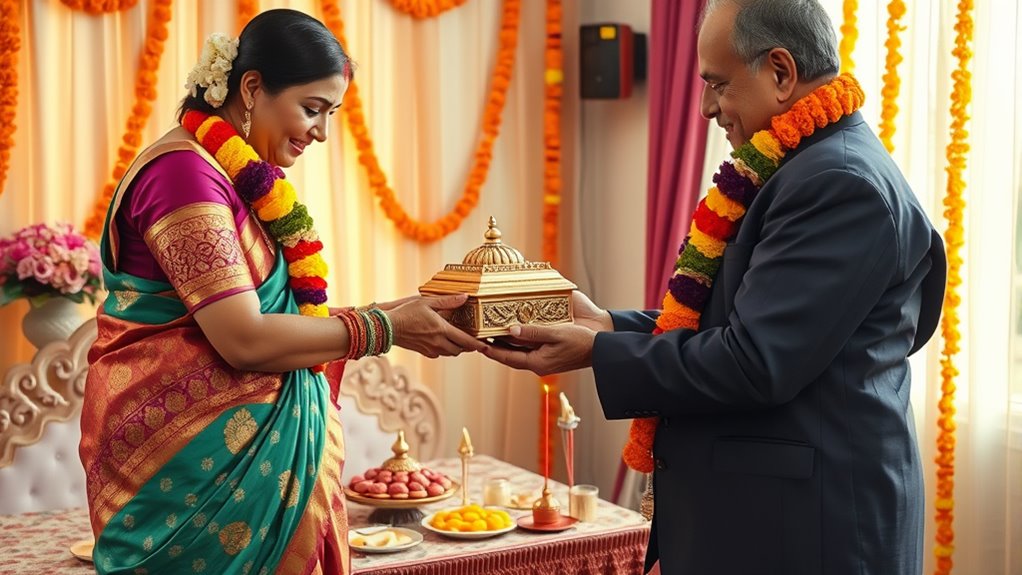
Timing is crucial when giving a gift in India, as it demonstrates your respect for the occasion and the recipient. Pay attention to timing considerations, such as choosing the right moment—whether during festivals, celebrations, or personal milestones—to show your thoughtfulness. Being aware of the situational context is equally important; avoid giving gifts at inappropriate times, like during a serious business meeting or when someone is unwell. Your situational awareness helps you gauge when your gesture will be appreciated and well-received. For example, gifting during festivals like Diwali or weddings aligns with cultural expectations and enhances your relationship. Remember, carefully considering the timing and context reflects your respect for Indian customs and strengthens your connection with the recipient. Additionally, understanding cultural gift‑giving etiquette ensures your gesture is appropriate and meaningful.
Regional Variations and Cultural Sensitivities
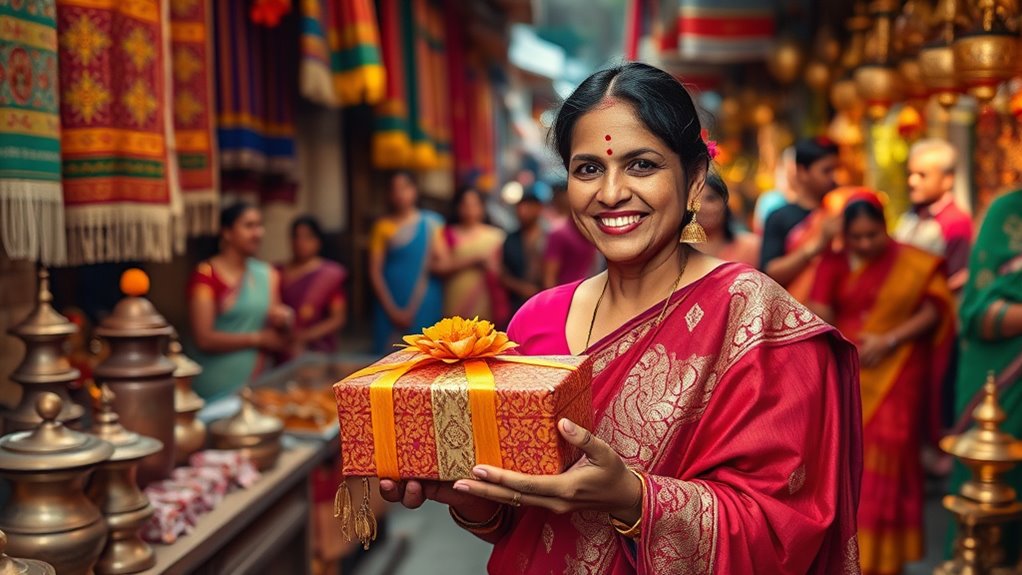
India’s diverse regions each have unique customs and sensitivities surrounding gift-giving. You should be aware of regional customs and cultural sensitivities to avoid misunderstandings. For example:
- In northern India, avoid giving leather items to Hindus, as they are considered sacred.
- In southern India, gifts should be wrapped in bright colors like yellow or orange, symbolizing auspiciousness.
- In some regions, clocks or sharp objects are seen as bad luck, so avoid these items.
- Respect local customs by understanding which gifts are appropriate during festivals or religious occasions.
- Practicing mindful decluttering when choosing gifts can help ensure that only meaningful and appropriate items are given, respecting both cultural values and environmental sustainability.
- Being aware of regional gift preferences can foster goodwill and demonstrate cultural sensitivity.
- Additionally, understanding cultural gift‑giving etiquette can help prevent unintended offenses and strengthen relationships. An understanding of cultural symbolism can further enhance respectful gift exchanges in different areas.
- Incorporating local traditions into your gift choices shows respect and appreciation for regional customs.
Etiquette for Business Gift Exchanges
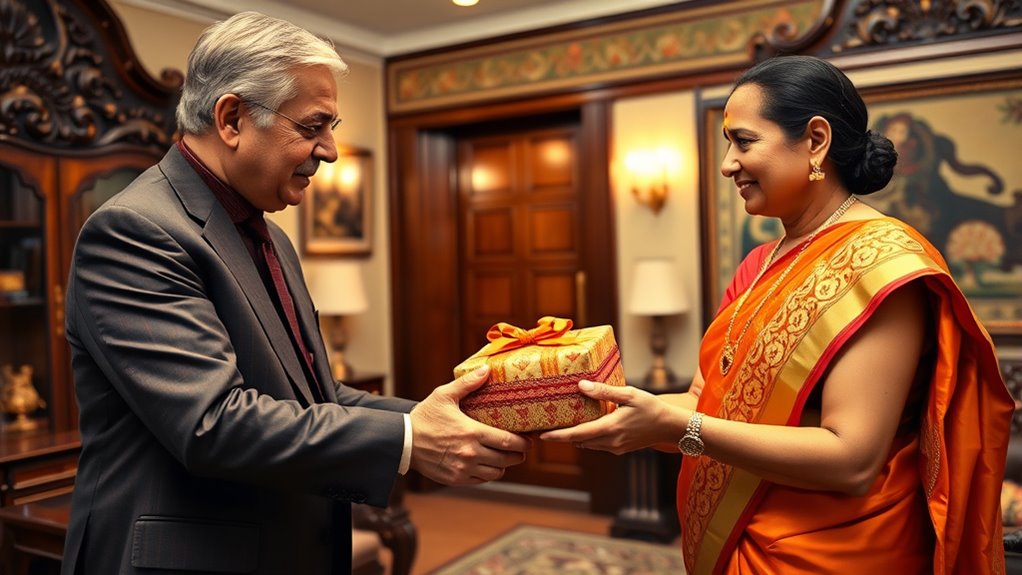
When engaging in business gift exchanges in India, understanding proper etiquette is essential to fostering respectful relationships. First, check the company’s corporate gift policies to ensure your gift aligns with their regulations. Avoid overly expensive or lavish presents, as they can create discomfort or appear inappropriate. Respect personal gift boundaries; don’t give gifts that might be considered intrusive or too personal. When presenting a gift, do so with both hands as a sign of respect, and avoid revealing the gift immediately to maintain humility. It’s customary to accept gifts graciously, even if you can’t reciprocate immediately. Keep the focus on modesty and thoughtfulness, and remember that the gesture often matters more than the gift’s value. Being aware of cultural sensitivities related to gift-giving can help prevent misunderstandings and strengthen business relationships. Additionally, understanding the relationship dynamics involved in gifting can foster trust and mutual respect within Indian professional contexts.
Frequently Asked Questions
How Do I Choose a Culturally Appropriate Gift for a Specific Indian Community?
When choosing a gift for a specific Indian community, you should consider regional traditions and community preferences. Research their customs to determine appropriate items, avoiding anything that might be offensive. Opt for respectful, thoughtful gifts like traditional crafts or items linked to their culture. Keep in mind local color, symbols, and religious sensitivities. By doing so, you show respect and appreciation, fostering positive connections within that community.
Are There Any Gifts That Are Considered Offensive or Taboo in India?
Think of giving gifts like maneuvering a maze—there are off-limits, like offensive gifts or taboo items. In India, avoid items like sharp objects (knives, scissors) that symbolize cutting ties, or anything associated with the number four, considered unlucky. Also, steer clear of alcohol in certain communities, and avoid gifts that might offend religious sentiments. Being mindful shows respect and helps you avoid unintentional offense.
What Is the Role of Astrology or Numerology in Gift Selection?
You might wonder about astrology or numerology’s role in gift-giving in India. You should consider astrological compatibility and numerology significance, as they influence gift choices. For example, selecting items that match someone’s zodiac sign or auspicious numbers can show respect and thoughtfulness. By incorporating these beliefs, you demonstrate cultural awareness, making your gift more meaningful and appreciated.
How Do Gift-Giving Customs Differ Between Urban and Rural Areas?
You might be surprised to find that gift-giving customs differ quite a bit between urban traditions and rural customs in India. In cities, you often see more relaxed, modern practices with casual gift exchanges, while in rural areas, traditional rituals and community bonds shape the process. Rural customs emphasize respect and symbolism, whereas urban traditions focus on practicality and personal preference, making each experience unique.
What Are the Unwritten Rules for Gift-Giving During Festivals and Religious Ceremonies?
During festivals and religious ceremonies, you should follow unwritten rules like using traditional gift wrapping with vibrant colors and avoiding black or white paper. Include a thoughtful greeting card, respecting local etiquette, and avoid overly personal or expensive gifts. Present your gift with both hands as a sign of respect, and be mindful of customs, such as giving sweets or symbolic items, to make sure your gesture is appreciated and culturally appropriate.
Conclusion
By understanding India’s gift-giving etiquette, you open the door to genuine connections and respect. When you choose the right gift, present it thoughtfully, and consider regional customs, you might find yourself unexpectedly welcomed into someone’s life—a simple act of kindness becoming a cherished memory. In India, even a small gesture can create lasting bonds, reminding you that sometimes, the most meaningful moments happen when you least anticipate them.
